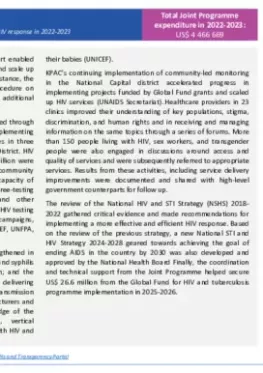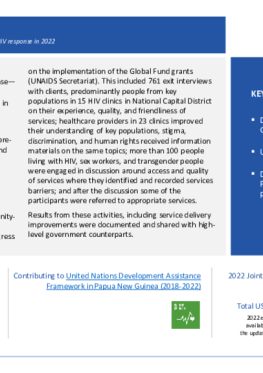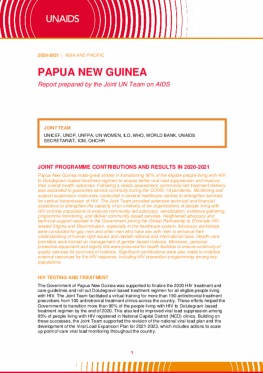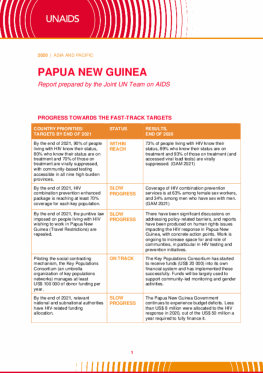|
Papua New Guinea
In Papua New Guinea, the Joint Programme’s support enabled the government to reinforce national HIV strategies and scale up services among vulnerable and key populations. For instance, the implementation of the new standard operating procedure on PrEP guidelines made PrEP services available in two additional clinics (WHO, UNAIDS Secretariat).
Access to HIV services for key populations was expanded through the Key Population Advocacy Consortium (KPAC), implementing community-based HIV testing and prevention services in three provinces and HIV self-testing in the National Capital District. HIV test kits and antiretroviral medicines worth US$ 2 million were also procured by the Joint Programme; and 100 community service providers were trained on improving their capacity of delivering these services in line with the new three-testing algorithm and guidelines. In addition, KPAC and other community-based organizations increased demand for HIV testing and PrEP services among key populations via several campaigns, thanks to the support from Joint Programme (UNICEF, UNFPA, UN Women, WHO, UNAIDS Secretariat).
Prevention of vertical transmission of HIV was strengthened in three provinces through the procurement of dual HIV and syphilis test kits, which benefitted 75 000 pregnant women; and the training of 150 Village Health Assistants (VHA) on delivering maternal and child immunization and vertical transmission services. In addition, more than 60 health workers, lecturers and tutors in vocational schools improved their knowledge of the three-testing algorithm, early infant diagnosis, vertical transmission of HIV and referrals for mothers living with HIV and their babies (UNICEF).
KPAC’s continuing implementation of community-led monitoring in the National Capital district accelerated progress in implementing projects funded by Global Fund grants and scaled up HIV services (UNAIDS Secretariat). Healthcare providers in 23 clinics improved their understanding of key populations, stigma, discrimination, and human rights and in receiving and managing information on the same topics through a series of forums. More than 150 people living with HIV, sex workers, and transgender people were also engaged in discussions around access and quality of services and were subsequently referred to appropriate services. Results from these activities, including service delivery improvements were documented and shared with high-level government counterparts for follow up.
The review of the National HIV and STI Strategy (NSHS) 2018-2022 gathered critical evidence and made recommendations for implementing a more effective and efficient HIV response. Based on the review of the previous strategy, a new National STI and HIV Strategy 2024-2028 geared towards achieving the goal of ending AIDS in the country by 2030 was also developed and approved by the National Health Board Finally, the coordination and technical support from the Joint Programme helped secure US$ 26.6 million from the Global Fund for HIV and tuberculosis programme implementation in 2025-2026.





